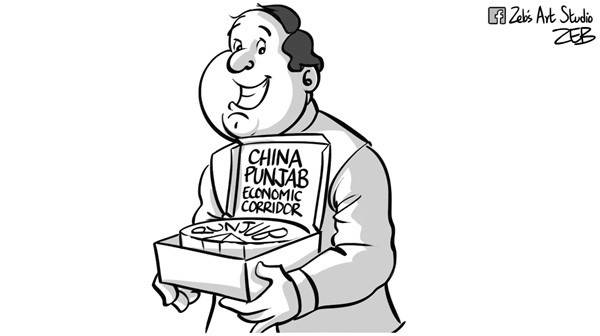
Private schools
Sir,
It is disillusioning to see the worsening state of educational institutes in Pakistan; especially private schools, with regards to provision of employees’ rights and benefits. The concept of work ethics and work-life balance is indeed proving to be a theoretical concept, which is least applicable in private schools here. The teachers working in private schools are not paid commensurate with their qualifications and experience, as well as effort and time invested in their jobs.
In addition, the health and wellbeing of teachers at private schools seem to be neglected by the upper management. The execution of the work is deemed to be more essential than the health and wellbeing of teachers. It is indeed inhuman to see that teachers are overburdened with intense work; and are not even compensated by adequate extrinsic and intrinsic incentives. There exists a massive discrimination in provision of rewards and benefits to the head and management, and the teachers in private schools.
The question, which needs to be addressed, is that are teachers merely deemed to be work machines at schools? Is the philosophy of a work-life balance, employee motivational strategies and work ethics merely confined to books of management? Do not they have practical real-life implications?
It is indeed inevitable to address the serious anomalies existing in private schools in Pakistan, regarding inequitable distribution of resources between management and teachers, and poor employee motivational programmes. There should be a stringent mechanism to monitor and evaluate the provision of rewards and benefits to teachers, who are the backbone of the educational sector.
Aiyza Javaid,
Lahore.
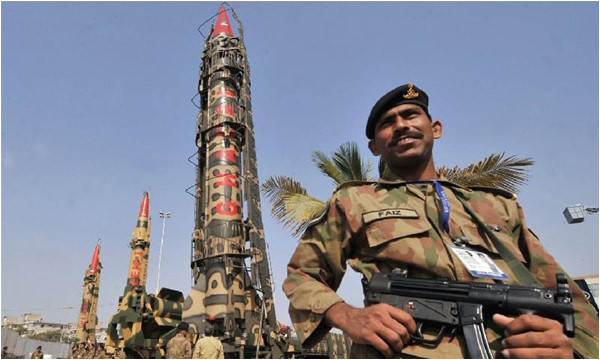
Creating doubts
Sir,
Western institutions’ hue and cry over Pakistan’s nuclear programme and strategic assets comes in no dearth, but the recent report of King’s College London (KCL) – titled “Pakistan’s Strategic Nuclear and Missile Industries” – is the first of its kind, as it attempts to hit hard on Pakistan’s missile programme in such detail.
KCL, as is well-known, is a premier, globally renowned institution serving as one of the world’s leading multidisciplinary research universities, and is considered as an authoritative source of academic research, which is globally valued. The report, launched by KCL’s Project Alpha, came just hours before the Nuclear Suppliers’ Group’s consultative meeting (November 10) and informal plenary session (November 11) in Vienna for deliberations on the membership of non-NPT countries; India and Pakistan.
Pakistan has faced allegations repeatedly that being a non-NPT state, it has proliferated nuclear technology to other countries, and also proliferated technology inwards to make its own bomb. Notably, the same argument is not applied to India, which is also a non-NPT state but is generally presented as having a ‘responsible’ record at the proliferation front. Pity, that is. It was on the back of such a ‘record’ that India was granted a highly controversial waiver in 2008 from NSG, allowing it to have nuclear trade with cartel countries. Similarly when in May 2016 both India and Pakistan applied for NSG membership, India received a welcoming response with the support of the US, while Pakistan is consequently fighting its case on the criterion based approach. Thanks to some strong opposition to ‘pick and choose’ type of approach – from within NSG spearheaded by China – the US and other India-backers have so far not been able to have their way. Seen in this backdrop, the timing of the launch of the report becomes very significant. Targeted, indeed.
Pakistan has presented a strong case for its bid to enter into the group on the basis of its strong commitment to the international objectives of nuclear non-proliferation and robust command and control systems of its civilian nuclear programme. It is well known to the world that Pakistan has instituted an elaborate export control regime, legislative framework and comprehensive regulatory and administrative measures. Its export control lists are in harmony with those of the NSG, Missile Technology Control Regime and the Australia Group. Islamabad’s official position is that Pakistan’s desire to participate in the NSG stands on solid grounds of technical experience, capability and well-established commitment to nuclear safety.
But this report, as mentioned above, could give an advantage to India and questions could be raised on the Pakistan’s commitment to export control regime and its opposition to the “exclusive membership” of the NSG for India.
Fatima Habib,
Islamabad.
Pakistan and Bangladesh
Sir,
Demand by the Muslim League as per Lahore Resolution was that “geographically contiguous units in northwestern and northeastern zones of India with Muslim majority should be Independent States”. Thus it was a demand for creation of Pakistan and Bengal, nomenclature coined earlier for these zones. This resolution was popularly referred to as the Pakistan Resolution.
Subsequently, the Lahore Resolution was replaced by Delhi Resolution 1946 with the demand that “the zones comprising Bengal and Assam in the North-East and the Punjab, North-West Frontier Province, Sind and Baluchistan in the North-West of India, namely Pakistan zones where the Muslims are in a dominant majority, be constituted into a sovereign independent State”. No reason was given for this fundamental change in the earlier formula. Soon after this Pakistan Resolution, the British rulers proposed a confederation of these two zones with the rest of the British India. That plan was accepted by Muslim League and National Congress but was then sabotaged by the latter.
After the creation of Pakistan in 1947 it was a big challenge to govern a country which had two remote main lands. A confederation of two units was proposed in 1966 by leaders of eastern zone which was not accepted by leaders of western zone. Consequently in December 1971 there was separation of twins as Bangladesh and present Pakistan. Soon after I had an opportunity to meet Chaudary Muhammad Ali, former Prime Minister of Pakistan, and enquired as to why the original plan of two states was changed. He replied that an independent northeastern country was not considered feasible because Bengali Muslims were a “very weak community” Invariable geographical factor was thus ignored for variable sociological factor.
Taraq Jazy,
Lahore.
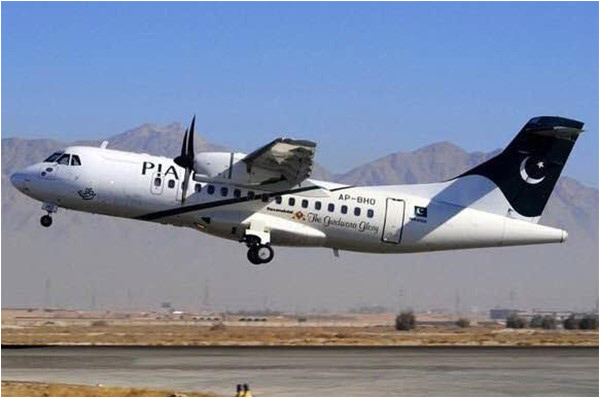
ATR-42 crash
Sir,
Ever since 2000, Pakistan’s aviation industry has witnessed a continuous decline in its flight safety record. Major responsibility falls on all those who were at the helm in Islamabad, CAA and ministry concerned for ensuring that all airlines including PIA, Shaheen conform to internationally approved safety standards, maintenance procedures, passenger and aircraft insurance requirements etc. Flight safety can only be assured through strict regulatory controls and giving exemplary punishment to serve as deterrence for others.
Till date, not a single fatal crash occurring in Pakistani airspace jurisdiction involving a CAA registered aircraft has been properly investigated and no report has been made public. Such a report is required by insurance companies to pay the insured amount as compensation, which has not been paid to the next of kin of the AirBlue and Bhoja crash victims. The major factor in PIA’s flight safety deterioration, which although better than other Pakistani airlines, is maintenance problems and flaws in choice of fleet induction, incompetent and corrupt politically appointed chief executives and compromises in recruitment, which have adversely affected their human resources in all cadres.
Aneela Chandio,
Sukkur.
Reassessing
Sir,
As 2016 draws to an end, the Pakistani nation suffers another tragic loss. The sad demise of around 47 individuals including pop-singer turned evangelist Junaid Jamshed in an airplane crash at Havelian, has mingled the seasonal wintery breeze enveloping the region with an air of grief and gloom that weighs heavy upon every Pakistanis heart. While investigations to determine the root cause of the crash are still underway with researchers bringing forth their hypothesis aimed at understanding the national tragedy, the disturbingly exigent reality that this airplane crash alludes towards is the distorted prioritizing concerns of the national leadership, when it comes to manifesting real development or even combating existential ills threatening the very stability of the state.
Since more than a decade now, the national flag carrier Pakistan International Airlines has been in the limelight for all the wrong reasons. Be it the case of delayed domestic or international flights, corruption scandals or the tragic air crashes resulting from unaddressed airplane malfunctions, PIA’s condition is despicable to say the least. It not only manifests the harrowing repercussions defining institutions and their performance when mismanaged but also testifies the fact that institutional strength is necessarily contingent upon its inherent operational dynamics and not solely on the individuals governing them.
This is not only true for PIA, but also for the varied public institutions that are responsible for the smooth running of state affairs. Institutional weakness in Pakistan can also be gauged from the fact that the Brookings paper on the Index of State Weakness and in Developing Countries makes a mention of Pakistan along with politically unstable and economically impoverished countries of the world including Niger, Ethiopia and Burma, all due to the fact that Pakistan’s institutions manifest similar nature of failings and flaws as institutions in these countries.
Despite this overarching reality, the heart of the matter is that institutional strength has never really been on the cards for the leadership in Pakistan. The leadership has displayed much proclivity for ranting and raving the exigency of maintaining a democratic culture in Pakistan, without in actuality working towards fortifying the plethora of national institutions that would in the longer run ensure democracy in true letter and spirit. This reminds me of what President Barack Obama remarked on his maiden visit to Africa in 2009, where while addressing the economic turmoil of Africa he stated that Africa does not need “strong men” instead, it needs “strong institutions” to progress forward. This same reality aptly applies to Pakistan, where we need to enable institutions to strengthen from within and thereby erect their credibility, irrespective of the caste, creed, or political motivations of the individuals governing them, to create and maintain an environment conducive to political, economic and social stability.
Marria Qibtia Sikandar Nagra,
Lahore.
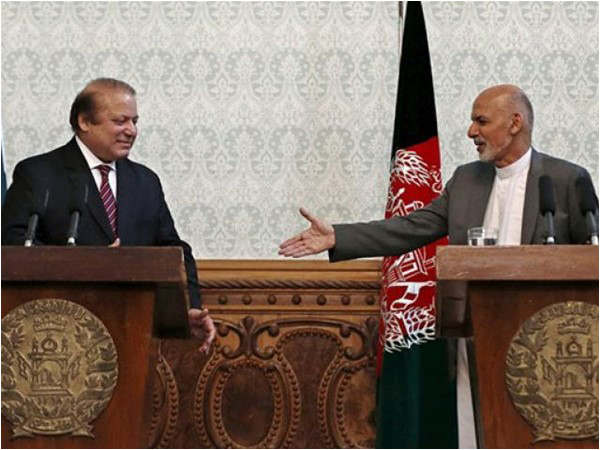
Humiliation
Sir,
The humiliating treatment meted out to Sartaj Aziz by Afghan President Ashraf Ghani and Narendra Modi is shocking, to say the least. While the attitude of Modi is due to his intense hatred of Pakistan, Ghani conveniently forgot how much Afghanistan owes to Pakistan, which was at the forefront to oust the Soviet Union from his country (while India supported the Soviet occupation). Pakistan has hosted three million Afghan refugees for over thirty years now. Ghani displayed his servitude to Modi by refusing to accept Pakistan’s generous offer of 500 million dollars to help in the reconstruction of Afghanistan, saying that Pakistan should use the money to curb terrorism.
The time has come to get tough with Afghanistan. We have a trade transit agreement with that country which is being used to flood Pakistan with goods meant for Afghanistan, causing many of our industries to collapse and threatening many others with closures. Hosting the refugees has resulted in arms and drug smuggling, along with terrorism which has cost the lives of over fifty thousand Pakistanis.
We should start by revising the Afghan Transit Trade Agreement and impose the same conditions on Afghanistan as India has imposed on Nepal, recovering full custom duty at Indian sea ports on all Nepalese imports and refunding the duty amount to Nepal at the end of the financial year. Naturally, Nepalese importers are forced to buy most of their requirements from India, and to import only those goods which are not manufactured in India. We should also arrange for the immediate repatriation of Afghan refugees from Pakistan. Only then will Ashraf Ghani realize how much his country owes Pakistan.
Shakir Lakhani,
Karachi.
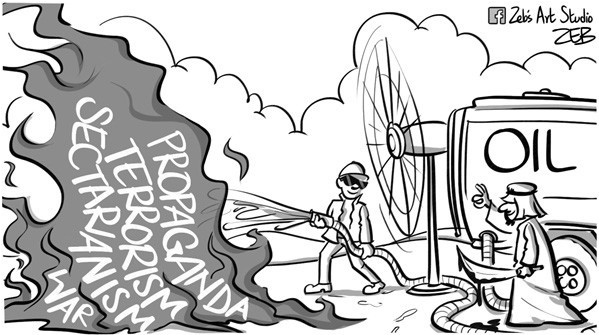
Calm them down
Sir,
Relations between Riyadh and Tehran have been tense ever since the Islamic Republic of Iran was established as a result of the Iranian Revolution of 1979. In recent time, religious competition between the Islamic world’s Shia and Sunni powerhouses has turned into a burgeoning geopolitical rivalry. But Saudi Arabia’s recent decision to execute prominent Shia cleric Sheikh Nimr Al-Nimr has brought Saudi-Iranian relations to their lowest. The two Middle Eastern giants are raising the level of hostilities between them at considerable risk to peace in the region. Because of the Iranian and Saudi tussle, the whole region is now looking divided on sectarian lines. Saudi Arabia severed all diplomatic relations with Iran. Saudi allies Bahrain, Sudan and Djibouti quickly followed the same. Other Gulf Cooperation Council (GCC) allies like Kuwait, Qatar and the United Arab Emirates opted for the less drastic measure of recalling their ambassadors. On the other hand, the Shia camp has also reacted very sharply. Hezbollah issued a statement calling al-Nirm’s execution an “assassination” and an “ugly crime”. In Tehran, hardliners stormed the Saudi embassy, which is against universally agreed-upon rules of foreign relations safeguarding diplomatic missions. But all these developments are just the start of a major conflict that is about to start in the region.
The struggle between Riyadh and Tehran for political and religious influence has geopolitical implications that extend far beyond the placid waters of the Gulf and encompass nearly every major conflict zone in the Middle East. A diplomatic rupture between the major Sunni and Shia powers in the region will resonate across the Middle East, where they back opposing sides in many destructive wars and simmering conflicts. The first casualty was the collapsed ceasefire between Houthi rebels and Saudis. The next one will probably be the planned UN-led conference in Vienna to negotiate a political settlement between the warring parties in Syria, which is not wholeheartedly supported by Saudi Arabia anyway. Moreover, more unrest can be expected in Iraq, Lebanon and even Bahrain because of the recent Saudi and Iran tussle. Now in such a supercharged atmosphere, the moderate middle ground has been sorely weakened and advocates of a hardliner approach to regional affairs now hold sway. Some analysts believe that Saudi Arabia may be deliberately fanning the flames of war in its region in a bid to sabotage the agreement between Iranians and the international community led by the United Nations Security Council permanent members plus Germany. But Iran also didn’t respond in the whole episode maturely.
Some effective and immediate steps should be taken by the international community and the United Nations to calm down the boiling equation between the Saudis and Iranians. First of all, the January 25 international conference in Geneva that seeks a diplomatic solution to Syria’s civil war should be postponed in order to give Saudi Arabia and Iran a calming period. Secondly, the United States should reassure Saudi Arabia that they are not in going in favour of Iran at its cost so that Saudis remain calm and don’t feel insecure. Finally, the United Nations should send its envoy to both Riyadh and Tehran to convince the Saudis and Iranians to de-escalate the situation. We have to understand that it is very important to have cooperation between the Saudis and Iran as they are two major powers in West Asia. Moreover, this conflict between Saudis and Iranians will also complicate the fight against ISIS in the sense that ISIS will take the opportunity to exploit two regional powers going after each other rather than going after it.
Chaudhry Asad,
Lahore.

